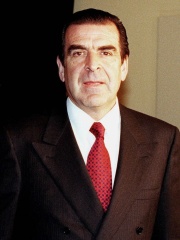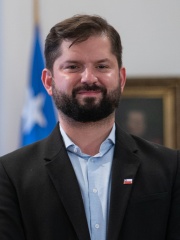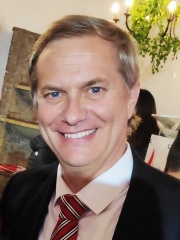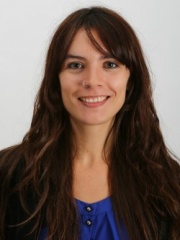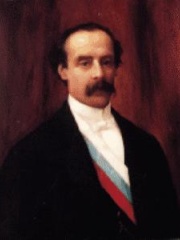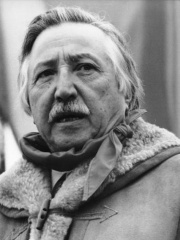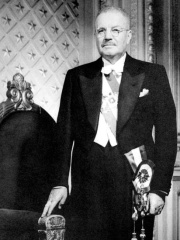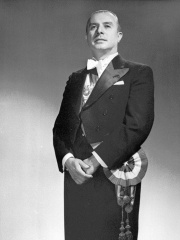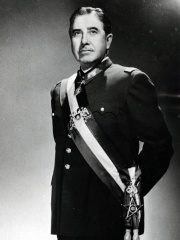
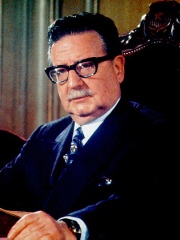
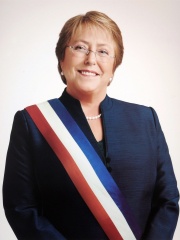
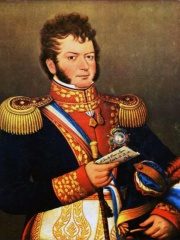
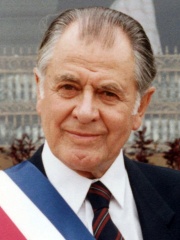
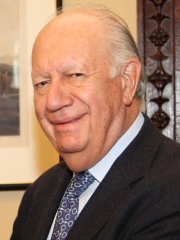
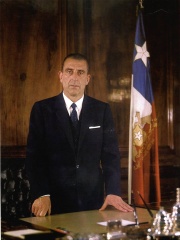
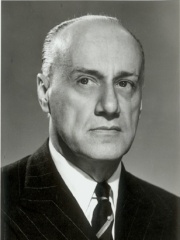
The Most Famous
POLITICIANS from Chile
This page contains a list of the greatest Chilean Politicians. The pantheon dataset contains 19,576 Politicians, 50 of which were born in Chile. This makes Chile the birth place of the 67th most number of Politicians behind Lebanon, and Algeria.
Top 10
The following people are considered by Pantheon to be the top 10 most legendary Chilean Politicians of all time. This list of famous Chilean Politicians is sorted by HPI (Historical Popularity Index), a metric that aggregates information on a biography's online popularity. Visit the rankings page to view the entire list of Chilean Politicians.

1. Augusto Pinochet (1915 - 2006)
With an HPI of 81.77, Augusto Pinochet is the most famous Chilean Politician. His biography has been translated into 101 different languages on wikipedia.
Augusto José Ramón Pinochet Ugarte (25 November 1915 – 10 December 2006) was a Chilean military officer, politician and dictator. From 1973 to 1981, he was the leader of the military junta, which in 1974 declared him President of Chile; in 1980, a referendum approved a new constitution confirming him in the office, after which he served as de jure president from 1981 to 1990. His time in office remains the longest of any Chilean ruler. Born in Valparaíso, Pinochet rose through the ranks of the Chilean Army to become General Chief of Staff in early 1972 before being appointed its commander-in-chief on 23 August 1973 by President Salvador Allende. On 11 September 1973, Pinochet seized power in Chile in a military coup. The military had previously received financial and intelligence support from the United States, which favored the military coup that toppled Allende's democratically elected socialist Unidad Popular government and ended civilian rule. In December 1974, the ruling military junta appointed Pinochet Supreme Head of the nation by joint decree, although without the support of one of the coup's instigators, Air Force general Gustavo Leigh. After his rise to power, Pinochet persecuted armed communists, leftists, socialists, and political critics, resulting in the executions of 1,200 to 3,200 people, the internment of as many as 80,000 people, and the torture of tens of thousands. According to the Chilean government, the number of executions and forced disappearances was at least 3,095. Operation Condor, a U.S.-supported terror operation focusing on South America, was founded at the behest of the Pinochet regime in late November 1975. Under the influence of the free market–oriented "Chicago Boys", Pinochet's military government implemented economic liberalization following neoliberalism. This policy included currency stabilization, removal of tariff protections for local industry, the banning of trade unions, and privatization of retirement funds and hundreds of state-owned enterprises. Some of the government properties were sold below market price to politically connected buyers, including Pinochet's son-in-law Julio Ponce Lerou. The regime used censorship of entertainment as a way to reward supporters of the regime and punish opponents. These policies increased economic inequality and produced high economic growth. They caused the 1982 monetary crisis, and thus produced its devastating effects on the Chilean economy. Pinochet's wealth grew considerably during his years in power through dozens of bank accounts secretly held abroad and holdings in real estate. He was later prosecuted for embezzlement, tax fraud, and kickbacks on arms deals. Pinochet's 17-year rule was given a legal framework through a controversial 1980 plebiscite, which approved a new constitution drafted by a government-appointed commission. In a 1988 plebiscite, 56% voted against Pinochet's continuing as president, which led to democratic elections for the presidency and Congress. After stepping down in 1990, Pinochet continued to serve as Commander-in-Chief of the Chilean Army until 10 March 1998, when he retired and became a senator-for-life in accordance with his 1980 Constitution. However, while in London in 1998 Pinochet was arrested under an international arrest warrant in connection with numerous human rights violations. Following a legal battle, he was released on grounds of ill-health and returned to Chile on 3 March 2000. In 2004, Chilean judge Juan Guzmán Tapia ruled that Pinochet was medically fit to stand trial and placed him under house arrest. By the time of his death on 10 December 2006, about 300 criminal charges were still pending against him in Chile for numerous human rights violations during his 17-year rule, as well as tax evasion and embezzlement during and after his rule. He was also accused of having corruptly amassed at least US$28 million.

2. Salvador Allende (1908 - 1973)
With an HPI of 81.05, Salvador Allende is the 2nd most famous Chilean Politician. His biography has been translated into 102 different languages.
Salvador Guillermo Allende Gossens (26 June 1908 – 11 September 1973) was a Chilean socialist politician who served as the 29th president of Chile from 1970 until his death in 1973. As a socialist committed to democracy, he has been described as the first Marxist to be elected president in a liberal democracy in Latin America. Allende's involvement in Chilean politics spanned a period of nearly forty years, during which he held various positions including senator, deputy, and cabinet minister. As a life-long committed member of the Socialist Party of Chile, whose foundation he had actively contributed to, he unsuccessfully ran for the national presidency in the 1952, 1958, and 1964 elections. In 1970, he won the presidency as the candidate of the Popular Unity coalition in a close three-way race. He was elected in a run-off by Congress, as no candidate had gained a majority. In office, Allende pursued a policy he called "The Chilean Path to Socialism". The coalition government was far from unanimous. Allende said that he was committed to democracy and represented the more moderate faction of the Socialist Party, while the radical wing sought a more radical course. Instead, the Communist Party of Chile favored a gradual and cautious approach that sought cooperation with Christian democrats, which proved influential for the Italian Communist Party and the Historic Compromise. As president, Allende sought to nationalize major industries, expand education, and improve the living standards of the working class. He clashed with the right-wing parties that controlled Congress and with the judiciary. On 11 September 1973, the military moved to oust Allende's democratically elected government in a coup d'état supported by the CIA. Declassified documents showed that US president Richard Nixon and his national security advisor Henry Kissinger were aware of the military's plans to overthrow Allende in the days before the coup d'état. As troops surrounded La Moneda Palace, Allende gave his last speech vowing not to resign. Later that day, Allende died by suicide in his office; the exact circumstances of his death are still disputed. Following Allende's death, General Augusto Pinochet refused to return authority to a civilian government, and Chile was later ruled by the Government Junta, ending more than four decades of uninterrupted democratic governance, a period known as the Presidential Republic. The military junta that took over dissolved Congress, suspended the Constitution of 1925, and initiated a program of persecuting alleged dissidents, in which at least 3,095 civilians disappeared or were killed. Pinochet's military dictatorship only ended after the successful internationally backed 1989 constitutional referendum led to the peaceful Chilean transition to democracy.

3. Michelle Bachelet (b. 1951)
With an HPI of 73.24, Michelle Bachelet is the 3rd most famous Chilean Politician. Her biography has been translated into 104 different languages.
Verónica Michelle Bachelet Jeria (Spanish: [beˈɾonika miˈtʃel βatʃeˈlet ˈxeɾja]; born 29 September 1951) is a Chilean politician who served as the 33rd and 35th president of Chile from 2006 to 2010 and from 2014 to 2018. She is the first and to date only woman to hold the presidency. She was re-elected in December 2013 with over 62% of the vote, having previously received 54% in 2006, making her the first President of Chile to be re-elected since 1932. After her second term, she served as United Nations High Commissioner for Human Rights from 2018 to 2022. Earlier in her career, she was appointed as the first executive director of the United Nations Entity for Gender Equality and the Empowerment of Women. Bachelet, a physician with studies in military strategy, also held positions as Health Minister and Defense Minister under President Ricardo Lagos. She is a separated mother of three and identifies as agnostic. In addition to her native Spanish, she is fluent in English and has proficiency in German, French, and Portuguese.

4. Bernardo O'Higgins (1778 - 1842)
With an HPI of 70.76, Bernardo O'Higgins is the 4th most famous Chilean Politician. His biography has been translated into 56 different languages.
Bernardo O'Higgins Riquelme (Spanish pronunciation: [beɾˈnaɾðo oˈ(x)iɣins] ; 20 August 1778 – 24 October 1842) was a Chilean independence leader who freed Chile from Spanish rule in the Chilean War of Independence. He was a wealthy landowner of Basque-Spanish and Irish ancestry. Although he was the second Supreme Director of Chile (1817–1823), he is considered one of Chile's founding fathers, as he was the first holder of this title to head a fully independent Chilean state. He was Captain General of the Chilean Army, Brigadier of the United Provinces of the Río de la Plata, General Officer of Gran Colombia, and Grand Marshal of Peru.
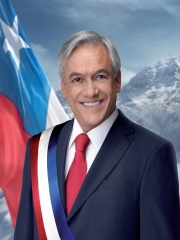
5. Sebastián Piñera (1949 - 2024)
With an HPI of 70.27, Sebastián Piñera is the 5th most famous Chilean Politician. His biography has been translated into 84 different languages.
Miguel Juan Sebastián Piñera Echenique (Spanish: [miˈɣel ˈxwan seβasˈtjam piˈɲeɾa etʃeˈnike] ; 1 December 1949 – 6 February 2024) was a Chilean businessman and politician who served as 34th and 36th president of Chile from 2010 to 2014 and from 2018 to 2022. The son of a Christian Democratic politician and diplomat, he studied business administration at the Pontifical Catholic University of Chile and economics at Harvard University. At the time of his death, he had an estimated net worth of US$2.7 billion, according to Forbes, making him the third richest person in Chile. A member of the liberal-conservative National Renewal party, he served as a senator for the East Santiago district from 1990 to 1998, running for the presidency in the 2005 election, which he lost to Michelle Bachelet, and again, successfully, in 2010. As a result, he became Chile's first conservative president to be democratically elected since 1958, and the first to hold the office since the departure of Augusto Pinochet in 1990. The legacy of Piñera's two administrations include the reconstruction following the 2010 Chile earthquake, the rescue of 33 trapped miners in 2010, a rapid response to the COVID-19 pandemic, and the legalization of same-sex marriage in Chile in 2021–2022. His administrations also faced the two largest protests movements since the return of democracy in 1990; the 2011 student protests and the more massive and violent 2019–2020 protests. After leaving office in 2022 Piñera developed amicable relations with the new left-wing president Gabriel Boric, who had previously been a harsh critic of him. Piñera died in a helicopter crash on Lake Ranco on 6 February 2024 at age 74. Piñera's supporters form a cross-party centre-right and right-wing faction called Piñerism.

6. Patricio Aylwin (1918 - 2016)
With an HPI of 67.36, Patricio Aylwin is the 6th most famous Chilean Politician. His biography has been translated into 38 different languages.
Patricio Aylwin Azócar (Latin American Spanish pronunciation: [paˈtɾisjo ˈelwin aˈsokaɾ] ; 26 November 1918 – 19 April 2016) was a Chilean politician, lawyer, author, professor and former senator who was the 30th president of Chile from 1990 to 1994. He was the first president to be elected after the end of Augusto Pinochet's military dictatorship following the 1988 Chilean presidential referendum, marking the Chilean transition to democracy in 1990. He was from the Christian Democratic Party. Born in Viña del Mar, to British descent on his father's side, Aylwin was an active politician since 1945. He was first elected Senator in 1965, and later became president of the Senate in 1971 under Salvador Allende's administration. After the 1973 coup, he led the Christian Democrat party on two separate occasions, and was elected president in 1989. His administration was defined by social and economic reforms, the latter of which led to a significant decrease in Chilean homeless population. Alywin was also a staunch supporter of the Chilean National Commission for Truth and Reconciliation, which sought to prosecute those involved in human rights violations during the dictatorship.

7. Ricardo Lagos (b. 1938)
With an HPI of 66.74, Ricardo Lagos is the 7th most famous Chilean Politician. His biography has been translated into 47 different languages.
Ricardo Froilán Lagos Escobar (Spanish pronunciation: [riˈkaɾðo fɾojˈlan ˈlaɣos eskoˈβaɾ]; born 2 March 1938) is a Chilean lawyer, economist and social-democratic politician who served as president of Chile from 2000 to 2006. During the 1980s he was a well-known opponent of the Chilean military dictatorship and astounded contemporaries in 1988 by openly denouncing dictator Augusto Pinochet on live television. He served as Minister of Education from 1990 to 1992 and Minister of Public Works from 1994 to 1998 under President Eduardo Frei Ruiz-Tagle before narrowly winning the 1999–2000 presidential election in a runoff against Independent Democrat Union (UDI) candidate Joaquín Lavín. Lagos was the third president from the centre-left Coalition of Parties for Democracy to have governed Chile since 1990. He was succeeded on 11 March 2006 by Socialist Michelle Bachelet, from the same coalition. From 2007 to 2010 he served as a Special Envoy on Climate Change for the United Nations Secretary-General Ban Ki-moon. Lagos made an unsuccessful bid to run for president in the 2017 Chilean general election.

8. Eduardo Frei Montalva (1911 - 1982)
With an HPI of 65.97, Eduardo Frei Montalva is the 8th most famous Chilean Politician. His biography has been translated into 39 different languages.
Eduardo Nicanor Frei Montalva (Spanish pronunciation: [eˈðwaɾðo fɾej monˈtalβa]; 16 January 1911 – 22 January 1982) was a Chilean political leader. In his long political career, he was Minister of Public Works, president of his Christian Democratic Party, senator, President of the Senate, and the 28th president of Chile from 1964 to 1970. His eldest son, Eduardo Frei Ruiz-Tagle, also became president of Chile (1994–2000). Said political party supported the Armed Forces intervention to remove his successor Salvador Allende from office in 1973, after the Chamber of Deputies, on 22 August 1973, accused Allende of violating the Constitution. He was later a vocal opponent of the Augusto Pinochet regime. On 22 January 1982, Frei died in Santiago, Chile, following surgery. Assassination was suspected by some but has never been proven. On 18 August 2023, the Supreme Court ruled out the assassination charges and declared innocent all those accused.

9. Jorge Alessandri (1896 - 1986)
With an HPI of 63.67, Jorge Alessandri is the 9th most famous Chilean Politician. His biography has been translated into 35 different languages.
Jorge Eduardo Alessandri Rodríguez (Latin American Spanish: [ˈxoɾxe aleˈsandɾi roˈðɾiɣes]; 19 May 1896 – 31 August 1986) was the 27th President of Chile from 1958 to 1964, and was the candidate of the Chilean right in the crucial presidential election of 1970, which he lost to Salvador Allende. He was the son of Arturo Alessandri, who was president from 1920 to 1925 and again from 1932 to 1938.
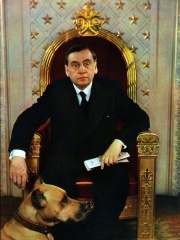
10. Arturo Alessandri (1868 - 1950)
With an HPI of 63.05, Arturo Alessandri is the 10th most famous Chilean Politician. His biography has been translated into 33 different languages.
Arturo Fortunato Alessandri Palma (Latin American Spanish: [aɾˈtuɾo foɾtu'nato aleˈsandɾi ˈpalma]; December 20, 1868 – August 24, 1950) was a Chilean political figure and reformer who served thrice as president of Chile, first from 1920 to 1924, then from March to October 1925, and finally from 1932 to 1938. He was a member of the Liberal Party.
People
Pantheon has 50 people classified as Chilean politicians born between 1768 and 1988. Of these 50, 6 (12.00%) of them are still alive today. The most famous living Chilean politicians include Michelle Bachelet, Ricardo Lagos, and Eduardo Frei Ruiz-Tagle. The most famous deceased Chilean politicians include Augusto Pinochet, Salvador Allende, and Bernardo O'Higgins.
Living Chilean Politicians
Go to all RankingsMichelle Bachelet
1951 - Present
HPI: 73.24
Ricardo Lagos
1938 - Present
HPI: 66.74
Eduardo Frei Ruiz-Tagle
1942 - Present
HPI: 62.82
Gabriel Boric
1986 - Present
HPI: 59.20
José Antonio Kast
1966 - Present
HPI: 52.41
Camila Vallejo
1988 - Present
HPI: 45.08
Deceased Chilean Politicians
Go to all RankingsAugusto Pinochet
1915 - 2006
HPI: 81.77
Salvador Allende
1908 - 1973
HPI: 81.05
Bernardo O'Higgins
1778 - 1842
HPI: 70.76
Sebastián Piñera
1949 - 2024
HPI: 70.27
Patricio Aylwin
1918 - 2016
HPI: 67.36
Eduardo Frei Montalva
1911 - 1982
HPI: 65.97
Jorge Alessandri
1896 - 1986
HPI: 63.67
Arturo Alessandri
1868 - 1950
HPI: 63.05
José Manuel Balmaceda
1840 - 1891
HPI: 62.75
Luis Corvalán
1916 - 2010
HPI: 62.42
Carlos Ibáñez del Campo
1877 - 1960
HPI: 62.24
Gabriel González Videla
1898 - 1980
HPI: 62.10
Overlapping Lives
Which Politicians were alive at the same time? This visualization shows the lifespans of the 25 most globally memorable Politicians since 1700.

